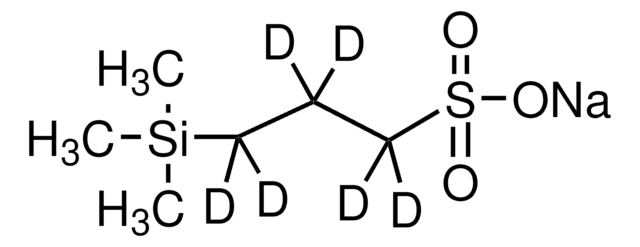343773
Óxido de deuterio
99.9 atom % D, contains 1 % (w/w) 3-(trimethylsilyl)-1-propanesulfonic acid, sodium salt (DSS)
Sinónimos:
Agua pesada, Agua-d2
Iniciar sesiónpara Ver la Fijación de precios por contrato y de la organización
About This Item
Fórmula empírica (notación de Hill):
D2O
Número de CAS:
Peso molecular:
20.03
EC Number:
MDL number:
UNSPSC Code:
12142201
PubChem Substance ID:
NACRES:
NA.21
Productos recomendados
isotopic purity
99.9 atom % D
Quality Level
form
liquid
contains
1 % (w/w) 3-(trimethylsilyl)-1-propanesulfonic acid, sodium salt (DSS)
technique(s)
NMR: suitable
bp
101.4 °C (lit.)
mp
3.8 °C (lit.)
SMILES string
[2H]O[2H]
InChI
1S/H2O/h1H2/i/hD2
InChI key
XLYOFNOQVPJJNP-ZSJDYOACSA-N
¿Está buscando productos similares? Visita Guía de comparación de productos
Categorías relacionadas
Application
Deuterium oxide can serve as a solvent in the :
- NMR analysis.
- 1HDOSY (Diffusion-Ordered Spectroscopy) NMR experiments.
Recommended products
Check out ChemisTwin®, our brand new online portal for identity confirmation and quantification of NMR spectra. Learn more or reach out to us for a free trial.
Storage Class
10 - Combustible liquids
wgk_germany
WGK 3
flash_point_f
Not applicable
flash_point_c
Not applicable
Elija entre una de las versiones más recientes:
¿Ya tiene este producto?
Encuentre la documentación para los productos que ha comprado recientemente en la Biblioteca de documentos.
Los clientes también vieron
The ionization constant of deuterium oxide from 5 to 50?.
Covington AK, et al.
The Journal of Physical Chemistry, 70(12), 3820-3824 (1966)
Structure of water and hydrophobic bonding in proteins. IV. The thermodynamic properties of liquid deuterium oxide.
Nemethy G and Scheraga HA.
J. Chem. Phys. , 41(3), 680-689 (1964)
Using high-performance quantitative NMR (HP-qNMR?) for certifying traceable and highly accurate purity values of organic reference materials with uncertainties< 0.1%.
Weber M, et al.
Accreditation and Quality Assurance, 18(2), 91-98 (2013)
Liset Westera et al.
Blood, 122(13), 2205-2212 (2013-08-16)
Quantitative knowledge of the turnover of different leukocyte populations is a key to our understanding of immune function in health and disease. Much progress has been made thanks to the introduction of stable isotope labeling, the state-of-the-art technique for in
Frank Grüne et al.
Anesthesiology, 120(2), 335-342 (2013-09-07)
Hyperventilation is known to decrease cerebral blood flow (CBF) and to impair cerebral metabolism, but the threshold in patients undergoing intravenous anesthesia is unknown. The authors hypothesized that reduced CBF associated with moderate hyperventilation might impair cerebral aerobic metabolism in
Nuestro equipo de científicos tiene experiencia en todas las áreas de investigación: Ciencias de la vida, Ciencia de los materiales, Síntesis química, Cromatografía, Analítica y muchas otras.
Póngase en contacto con el Servicio técnico






